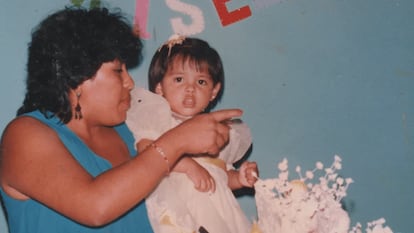Victims of forced sterilization in Peru take their case to the Inter-American Court of Human Rights
More than 270,000 women had their tubes tied without their consent during the Fujimori regime

It has been 26 years since the tragic death of Celia Ramos, who underwent an unnecessary and unwanted operation. In 1997, this young woman from Peru visited a health center seeking dental care but left with a handful of insistent recommendations to undergo a tubal ligation. Doctors identified the 34-year-old woman as a candidate of a sterilization plan initiated by Alberto Fujimori’s regime to combat poverty. Under pressure from health workers who regularly visited her home, Ramos underwent the procedure and died 19 days later. This case marks the first case of forced sterilizations in Peru before the Inter-American Court of Human Rights (IACHR). Despite the hundreds of thousands of women affected, conservative voices are attempting to downplay the case, casting doubt on the court’s credibility.
Between 1996 and 2001, Peru’s National Reproductive Health and Family Planning Program sterilized 272,028 women and 22,004 men. The actual number of procedures that were forcibly conducted is difficult to determine, but researchers estimate it to be around 90%. Peruvian prosecutors stated that the women who had the surgeries were pressured, threatened and offered food incentives without receiving adequate information. Celia Ramos and 17 other women died shortly after the operations. Despite tubal ligation being a safe and reliable form of permanent contraception, the government program failed to ensure minimum health standards or provide proper pre- and post-operative monitoring.
María Ysabel Cedano is a lawyer with DEMUS, one of the organizations representing 1,264 plaintiffs in the case before the IACHR (Peruvian prosecutors have moved to add another 2,264 plaintiffs). Cedano says they are seeking to have the case tried as a crime against humanity. “Bear in mind that in the 1990s, there was an internal armed conflict in Peru that targeted a specific civilian population, and the [sterilization] program was not implemented nationwide — it targeted a specific population. Considering that the Ministry of Health used the military to enforce the program, how can we expect a peasant, Indigenous or Quechua-speaking woman to refuse?” Moreover, said Cedano, “The scale of these operations raises concerns about consent. We’re talking about up to 90,000 ligations a year. It’s concerning how many women from remote areas said they signed a form without knowing that it would be an irreversible procedure. Consent is more than just a signature.”
Cedano wants Alberto Fujimori prosecuted. The former president is currently in prison for his role in the Barrios Altos and La Cantuta massacres. She also wants three former public health officials charged — Eduardo Yong Motta, Marino Costa Bauer and Alejandro Aguinaga — for violating the rights of Indigenous and peasant women.
Chile can play an important role in bringing Fujimori to justice. Although Fujimori is imprisoned in Peru, Chile was the country that convicted and extradited him in 2007 for corruption and serious human rights violations, including aggravated homicide, forced disappearances and torture. The Peruvian government can now ask Chile to add the forced sterilization program to these crimes. But according to Cedano, a Peruvian government attorney has not been assigned to pursue this. “It’s a tactic to further delay the judicial process,” said Florencia Reggiardo of the Center for Justice and International Law (CEJIL).
‘Our healing process starts with justice’
“This whole fight started with my dad. He actually filed a complaint about it years ago, but no one listened,” Marisela Monzón Ramos, one of Celia’s three daughters, told the EFE news agency. “Later on, my uncle took over because he couldn’t stand the injustice. Now, it’s our turn to make things right. Our healing process starts with justice and closing old chapters — not forgetting or giving up. We want the truth to be acknowledged, and we’re determined to get the fair compensation we’ve been fighting for and rightfully deserve.”
Despite all the personal testimony, efforts by feminist organizations, official reports and academic studies, the powerful Peruvian right wing persists in denying that forced sterilization happened. Alejandro Aguinaga, a former Fujimori official facing charges in the case, who is the current president of the congressional foreign relations committee, has repeatedly threatened on social media to reevaluate Peru’s membership in the IACHR. He has even suggested “disaffiliation” from the organization, saying, “leftist countries can keep it.” Dismissing such talk, Cedano said, “This is not an ideological fight — it’s about reparations for hundreds of thousands of victims.”
‘It was massive, mandatory and systematic’
Florencia Reggiardo categorically states, “It was a massive, mandatory and systematic program aimed only at peasant women, so that they would not reproduce. This was one of several Fujimori policies violating human rights. There is clear evidence that this program was implemented and had a terrible impact, yet there are still voices in Peru denying or ignoring it. The racist element here is significant. Even with the Inter-American Court’s involvement, ultra-conservatives persist in making the same arguments and attacks.”
Cedano and Reggiardo acknowledge that the IACHR’s ruling will be crucial for the country and the region. A decision favoring the plaintiffs would reinforce the progressive trend of Latin American courts, which have previously deemed forced sterilizations comparable to “torture” when challenging Chile and Bolivia in similar cases. “The significance of their ruling lies in preventing a regression in terms of human rights,” said Reggiardo. The legal process is in the first phase — presentation of the written lawsuit. Lawyers estimate the hearing will occur in a year, with a ruling approximately a year later.
The plaintiffs are demanding a public apology from the Peruvian government, financial compensation, scholarships for the victims, research on non-consensual sterilization, and public policies for training judges and health workers. “It’s high time for Peru to reckon with its history and ensure that Fujimori and the others will face punishment,” said Cedano. “Violence against women can’t be tolerated any longer.”
Sign up for our weekly newsletter to get more English-language news coverage from EL PAÍS USA Edition
Tu suscripción se está usando en otro dispositivo
¿Quieres añadir otro usuario a tu suscripción?
Si continúas leyendo en este dispositivo, no se podrá leer en el otro.
FlechaTu suscripción se está usando en otro dispositivo y solo puedes acceder a EL PAÍS desde un dispositivo a la vez.
Si quieres compartir tu cuenta, cambia tu suscripción a la modalidad Premium, así podrás añadir otro usuario. Cada uno accederá con su propia cuenta de email, lo que os permitirá personalizar vuestra experiencia en EL PAÍS.
¿Tienes una suscripción de empresa? Accede aquí para contratar más cuentas.
En el caso de no saber quién está usando tu cuenta, te recomendamos cambiar tu contraseña aquí.
Si decides continuar compartiendo tu cuenta, este mensaje se mostrará en tu dispositivo y en el de la otra persona que está usando tu cuenta de forma indefinida, afectando a tu experiencia de lectura. Puedes consultar aquí los términos y condiciones de la suscripción digital.









































